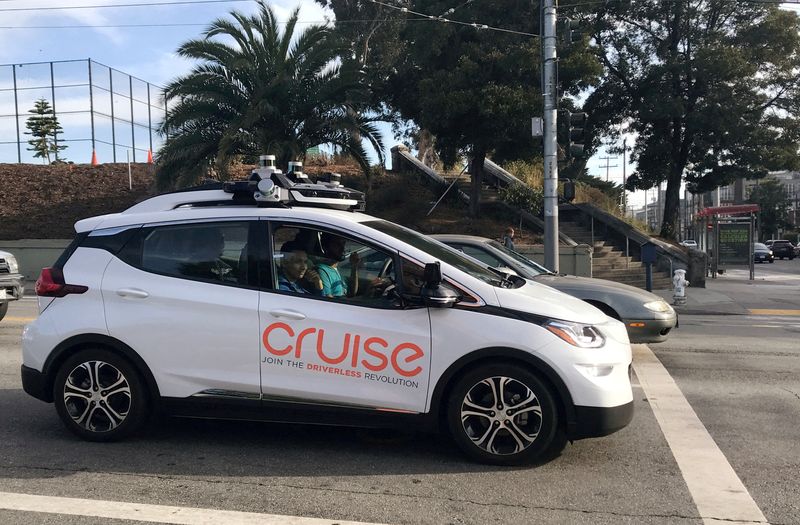By Greg Bensinger
SAN FRANCISCO (Reuters) -California just supercharged the self-driving car industry.
Following a contentious state agency vote, Alphabet (NASDAQ:GOOGL) Inc’s Waymo and General Motors’ Cruise are allowed to take paying passengers day or night throughout San Francisco, solidifying the tech hub as the center of the autonomous vehicle (AV) industry. It marks a significant step forward for the nascent technology.
The California Public Utilities Commission on Thursday sided with the companies in the face of vigorous opposition from some residents and city agencies. Commissioners heard more than six hours of public comment from residents and special interest groups supporting or opposing the measure that would expand paid autonomous vehicle service.
Transportation and safety agencies, such as the police and fire departments, as well as many residents had opposed expanding paid robotaxi service because of what they said were concerns about erratic driving and interference with their operations. The agencies, which have no regulatory authority, lobbied forcefully for a more measured rollout of the experimental vehicles.
In favor of the expansion were technologists and residents who said they felt the cars offer a safer alternative to human drivers and are a critical boost to San Francisco's economy.
The companies now have permission to begin citywide paid taxi service at all hours of the day and have said they plan to deploy more cars as a result. They collectively have more than 500 autonomous vehicles already in operation.
Before approving the expansion, Commissioner John Reynolds addressed some of the public's concerns. "While we don't yet have the data to judge AVs against the standard that humans are setting, I do believe in the potential of this technology to increase safety on the roadway."
Cruise and Waymo have been running experimental services limited by times and geographic areas within San Francisco. Neither indicated on Thursday how soon they may move to make round-the-clock taxi service a reality, but they promised to do so soon in promotional emails after the vote.
The move is a critical step forward in regulating the robot cars, which Waymo, Cruise and others have been systematically rolling out in cities and states around the nation.
The approval “marks the true beginning of our commercial operations in San Francisco,” said Tekedra Mawakana, Waymo co-CEO, in a prepared statement. It puts "Cruise in a position to compete with traditional ridehail, and challenge an unsafe, inaccessible transportation status quo," said Prashanthi Raman, Cruise vice president of global government affairs, in an emailed statement.
San Francisco is important as both a symbolic hub of tech and, with hundreds of AVs already in operation, the largest test lab for the experimental cars. The companies have said real-world testing in dense city environments is essential to perfecting the technology.
Waymo will be permitted to drive at speeds of up to 65 miles per hour and in inclement weather, while Cruise will be limited to 35 miles per hour and will not be allowed to drive when weather does not permit, the commission said Thursday.
The companies, who applied with the commission for permits to expand taxi service, have said their vehicles are safer than distractible human drivers and have yet to cause a life-threatening injury or death.
Cruise and Waymo will now also operate in direct competition with local companies Uber (NYSE:UBER) and Lyft (NASDAQ:LYFT) in offering rides summoned by app.
The vehicles, with empty driver seats and self-turning steering wheels, have become a common sight around San Francisco. Locals frequently document their driving hiccups on social media.
The robotaxi proposal had divided San Francisco between locals who resent their city being used as to test what they say is an unproven technology and those who say they feel the symbolic technology capital ought to be the leader in developing what could lead to fewer traffic accidents and injuries.
Hundreds of residents and members of various interest groups filed in to the commission's San Francisco hearing room to comment in one-minute increments on either side of the issue, citing issues ranging from accessibility for the disabled, safety, software coding, union activity and conflicts of interest, among a host of other concerns.
The commission had heard testimony from the San Francisco Municipal Transportation Agency that it had logged close to 600 incidents involving autonomous vehicles since spring of 2022 which they believe is "a fraction" of the total due to what they said are lax reporting requirements.
Commissioner Genevieve Shiroma advocated for a delayed vote noting the volume of public comment and her lingering concerns following evidence that the vehicles have obstructed emergency vehicles in San Francisco. She was the lone "no" vote.

"All it takes is one real life example of a driverless autonomous vehicle that prevents a first responder from doing its job in real time that convinces me that we should not approve citywide deployment," she said.
Technologists and other residents who supported the broader rollout of autonomous vehicles said they feared that a “no” vote could derail a local industry that brings jobs and attention to a city in desperate need of a financial lift.